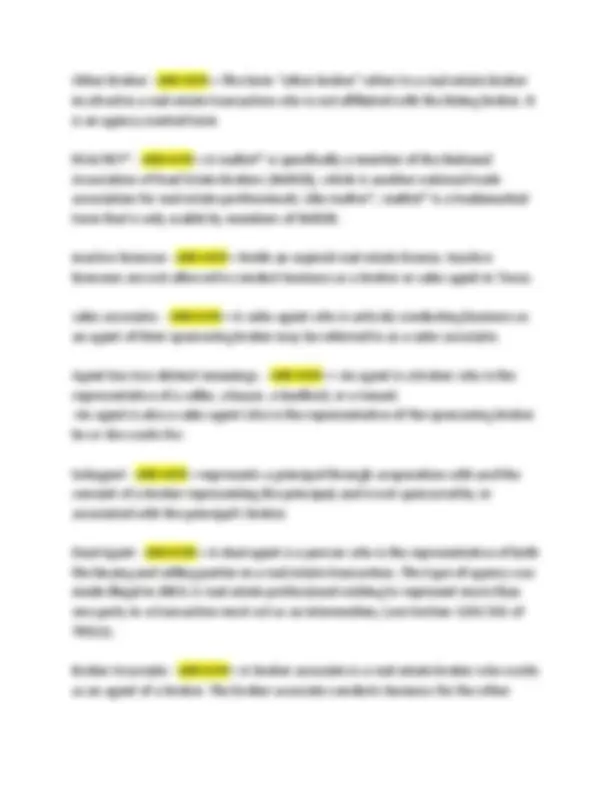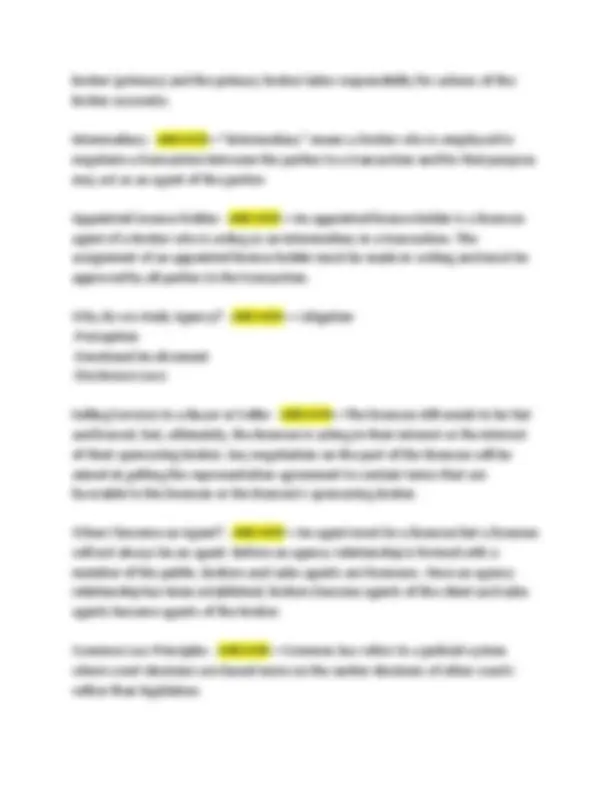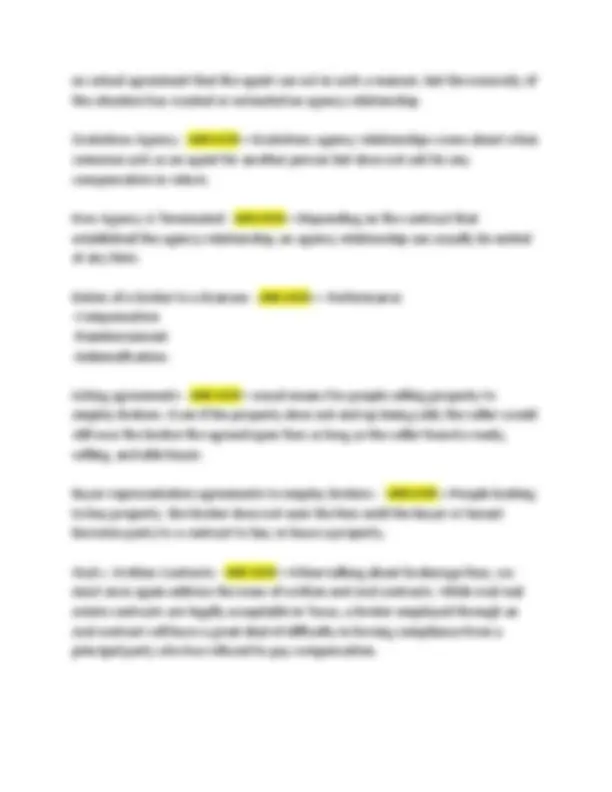










Study with the several resources on Docsity

Earn points by helping other students or get them with a premium plan


Prepare for your exams
Study with the several resources on Docsity

Earn points to download
Earn points by helping other students or get them with a premium plan
Community
Ask the community for help and clear up your study doubts
Discover the best universities in your country according to Docsity users
Free resources
Download our free guides on studying techniques, anxiety management strategies, and thesis advice from Docsity tutors
AYPO Real Estate Principles of Real Estate II Exam Study Guide Exam Questions With Correct Answers
Typology: Exams
1 / 14

This page cannot be seen from the preview
Don't miss anything!









The Original Legislation: - ANSWER>>The Real Estate Dealers Act of 1939
main piece of Texas law governing the licensing and behavior of real estate professionals in the state. - ANSWER>>The Real Estate License Act (TRELA)
Licensing Duties were added in: - ANSWER>>
Broker license was changed from 2 years in the 36 month before the application to: - ANSWER>>4 Years in the 60 months before application
TREC is the agency in charge of overseeing the licensing and professional activities of: - ANSWER>>-Real estate brokers -Real estate sales agents -Real estate inspectors -Providers of real estate and inspection education courses -Residential service companies -Timeshare developers -Easement or Right-of-Way (ERW) Agents
TREC Membership Makeup - ANSWER>>6 licensed real estate brokers and 3 members of the public, who are appointed by the Governor of Texas
Serving 6 year terms
Texas allows net listings with a limit on the percentage over the principal's required minimum. Currently, the percentage is capped at: - ANSWER>>15%.
How agency is formed - ANSWER>>An agency relationship is formed when one person or group of people employ another person or group to perform actions on
behalf of the first person or group. If a person moving into a new house hires a moving company to transport his or her furniture, an agency relationship has been formed.
Property owners and real estate agents create what kind of relationship? - ANSWER>>Property owners and real estate agents create
The broker decides that this is too big a task to handle alone and decides to assign different sales agents, who effectively work as agents for the broker, to each half of the project. The sales agents are - ANSWER>>De Facto Agents
Customers or Clients? - ANSWER>>What really defines whether someone is a customer or a client is whether a contractual agreement exists between a real estate professional and that person.
Client - ANSWER>>Someone who has formed a contractual agreement- Fiduciary duties are owed
Broker Licensee - ANSWER>>The broker licensee is the person who possesses a real estate broker's license from the Texas Real Estate Commission.
Unlicensed Broker - ANSWER>>The term "unlicensed broker" refers to anyone who acts as a broker and provides the services normally provided by a broker without holding a valid broker's license issued by TREC. Acting as an unlicensed broker is a violation of TRELA and a Class A misdemeanor.
Sponsoring Broker - ANSWER>>A sponsoring broker is the licensed broker a licensed real estate sales agent works for. The sales agent's license is issued through sponsoring broker, and the sponsoring broker is responsible for the brokerage activities of the sales agent.
broker (primary) and the primary broker takes responsibility for actions of the broker associate.
Intermediary - ANSWER>>"Intermediary" means a broker who is employed to negotiate a transaction between the parties to a transaction and for that purpose may act as an agent of the parties
Appointed License Holder - ANSWER>>An appointed license holder is a licensee agent of a broker who is acting as an intermediary in a transaction.-The assignment of an appointed license holder must be made in writing and must be approved by all parties to the transaction.
Why do we study Agency? - ANSWER>>-Litigation -Perception -Emotional Involvement -Disclosure Laws
Selling Services to a Buyer or Seller - ANSWER>>The licensee still needs to be fair and honest, but, ultimately, the licensee is acting in their interest or the interest of their sponsoring broker. Any negotiation on the part of the licensee will be aimed at getting the representation agreement to contain terms that are favorable to the licensee or the licensee's sponsoring broker.
When I become an Agent? - ANSWER>>An agent must be a licensee but a licensee will not always be an agent. Before an agency relationship is formed with a member of the public, brokers and sales agents are licensees. Once an agency relationship has been established, brokers become agents of the client and sales agents become agents of the broker.
Common Law Principles - ANSWER>>Common law refers to a judicial system where court decisions are based more on the earlier decisions of other courts rather than legislation.
Law of agency theory - ANSWER>>"he who acts through another, acts himself."
Confidentiality - ANSWER>>Confidentiality is one of the major fiduciary duties owed by an agent to his or her client. When an agency relationship is formed between a client and a broker who is part of a brokerage, the entire brokerage must act in a manner that respects the existence of that agency relationship. Licensees in the same brokerage who are not party to the agency relationship should still avoid revealing any confidential information that they learn about the broker's client or the transaction
Privity of Contract - ANSWER>>An agent of a broker cannot sue the client in order to get unpaid commission due to the lack of privity of contract.
Actual Authority - ANSWER>>where it was known to exist by both the principal and agent-Under the laws of agency, actual authority may be either express or implied.
Apparent Authority - ANSWER>>stems from a third party working with an agent who does not actually have the authority that the third party is led to believe he or she has.-This kind of authority is often written into the contract that establishes the agency relationship.-Apparent authority is not expressly detailed in the contract that establishes the agency relationship.
Implied Authority - ANSWER>>Implied authority is authority not specifically granted to an agent but assumed to be necessary to carry out duties related to any express authority.
Universal Agent - ANSWER>>A universal agent is an agent who is authorized to act for the principal in all, or nearly all, circumstances. Universal agents have very little limitation on actions they can take.- Even power of attorney for the diabled
-disclosure of known material facts about the property
Real estate agency agreements must be: - ANSWER>>written down
Three sample customer service duties are: - ANSWER>>-Maintain a welcoming place of business. -Respect the customer's time. -Make the customer feel important.
A person or organization that a person interacts with while acting as an agent for a principal party - ANSWER>>Third party
Material Facts - ANSWER>>Commonly, the important material facts that need to be revealed by the seller concern the conditions (e.g., termite damage, water damage, fault lines, etc.) and fixtures of a property (gas furnaces, carbon monoxide detectors, attached garages, etc.). Material facts that need to be revealed by the buyer normally involve the buyer's financial ability to buy the property.
Due diligence - ANSWER>>when one performs the research and investigation necessary to uncover known problems.
The Gramm-Leach-Bliley act - ANSWER>>says that financial institutions must take a variety of precautions with any form of personal information.
What is the name of the form created by TREC to help sellers meet the requirements of Section 5.008 of the Property Code? - ANSWER>>The Seller's Disclosure of Property Condition
Megan's Law - ANSWER>>Megan's Law was enacted in 1996 after seven-year-old Megan Kanka was raped and murdered by a sexual predator. Megan's Law requires the registration of sex offenders and public notification of private and personal information regarding registered sex offenders. Under Texas law, the
owners of single-family homes and real estate licensees are not required to disclose to potential buyers or tenants any information about registered sex offenders living in the area where a property is located.
Listing Agreement - ANSWER>>a contract between a real estate broker (and any agent representatives, acting in the broker's name) and a seller or sellers of real property. This kind of contract gives the broker the right to offer the property for sale.
The following are elements that will be found in nearly every kind of listing agreement: - ANSWER>>-The term of the listing -The listed price of the property -The broker's commission and broker fees -The broker's scope of authority
Express Contract - ANSWER>>all the involved parties to the contract normally state the conditions and terms of the contract in either a very formal or informal way, and it may be either in writing or verbal.
Implied Contract - ANSWER>>This type of contract is brought about by the intentions, relationships, and the actions of all the parties that are involved in the "agreement".
Can I recover Commission? - ANSWER>>A person may not maintain an action in this state to recover a commission for the sale or purchase of real estate unless the promise or agreement on which the action is based, or a memorandum, is in writing and signed by the party against whom the action is brought or by a person authorized by that party to sign the document
Exclusive Listing - ANSWER>>the broker still could be denied commission if the seller produces their own buyer under some types of exclusive listings.
A seller's disclosure is not required if: - ANSWER>>-This is the sale of a new (never been occupied) dwelling. -The sale is done by a financial institution that acquired the property in a deal to avoid foreclosure. -The seller is a court appointee and not the owner. -The seller is a governmental agency.
Subagent - ANSWER>>an unaffiliated broker working for the seller's agent who assists the seller's agent with a real estate transaction.
Buyer Brokerage Agreement - ANSWER>>this kind of agency relationship involves the real estate agent or firm acting as an agent representing the buyer in negotiating for the purchase of a property.- Works for the buyer and owes the buyer fiduciary duties
Non-Exclusive/Not for Compensation (Buyer Representation) - ANSWER>>First, the broker under this kind of buyer-broker agreement is not the only broker that the buyer can utilize for real estate services. Second, the buyer is not obligated to pay compensation. If the buyer uses a different broker for the final sale or finds a property and a willing seller on his or her own, the buyer is not required to pay compensation to the broker that was employed through this kind of agreement.
Non-Exclusive Right to Represent (Buyer Representation) - ANSWER>>The difference is that a non-exclusive right to represent buyer-broker agreement establishes commission payment for services provided by the broker attached to the agreement even if the buyer does not use that broker for the final sale. The commission is negotiable and the buyer does not have to pay the commission if it is covered by the seller.
Exclusive Right to Represent - ANSWER>>An exclusive right to represent buyer- broker agreement establishes that the broker, under this agreement, is the only
broker the buyer will employ while going through the property purchasing process. This kind of agreement also requires commission to be paid to the broker. As with a non-exclusive right to represent buyer-broker agreements, the commission can be negotiated and it can be paid by either the buyer or the seller.
Tenant Representation Agreements - ANSWER>>A tenant representation agreement is very similar to a buyer-broker agreement. In this case, the broker is representing a party that is looking to establish a rental or lease rather than purchase a property.
Who Does the Buyer Representation Agreement Belong To? - ANSWER>>The buyer representation agreement ultimately belongs to the brokerage.
?Is an Agency Relationship Required - ANSWER>>Technically, an agency relationship is not needed to assist a buyer during a transaction. Licensees can work with buyers informally as customers, eschewing any contractual agreement. Nor are agents of selling parties forbidden from providing assistance to buyers agents. However, seller's agents must not forget that dual agency is illegal in Texas.
The Creation of Buyer Agency - ANSWER>>A buyer agency relationship can be created by all the same methods as a seller's agency relationship: express contract or agreement, implication, or an operation of law. There is no requirement that a buyer representation agreement must be in writing.
The Creation of Buyer Agency Not Defined by Commission - ANSWER>>One mistake is to define an agency relationship by who pays the commission. A broker working as an agent for a buyer can be paid by the seller, the seller's agent, or the buyer. Who pays the commission does not change a licensee's relationship with a buyer.
All real estate contracts are required to: - ANSWER>>contain a termination date.
no actual agreement that the agent can act in such a manner, but the necessity of the situation has created or extended an agency relationship.
Gratuitous Agency - ANSWER>>Gratuitous agency relationships come about when someone acts as an agent for another person but does not ask for any compensation in return.
How Agency is Terminated - ANSWER>>Depending on the contract that established the agency relationship, an agency relationship can usually be ended at any time.
Duties of a broker to a licensee - ANSWER>>-Performance -Compensation -Reimbursement -Indemnification.
Listing agreements - ANSWER>>usual means for people selling property to employ brokers.-Even if the property does not end up being sold, the seller would still owe the broker the agreed upon fees as long as the seller found a ready, willing, and able buyer.
buyer-representation agreements to employ brokers. - ANSWER>>People looking to buy property - the broker does not earn the fees until the buyer or tenant becomes party to a contract to buy or lease a property.
Oral v. Written Contracts - ANSWER>>When talking about brokerage fees, we must once again address the issue of written and oral contracts. While oral real estate contracts are legally acceptable in Texas, a broker employed through an oral contract will have a great deal of difficulty in forcing compliance from a principal party who has refused to pay compensation.
Academic ethics - ANSWER>>focuses on how one determines what is ethical, and debates the advantages and disadvantages of the various types of ethical systems.
Practical ethics - ANSWER>>focuses on determining what is right and wrong within a specific moral system.
The Architectural Barriers Act of 1968 (or the ABA) - ANSWER>>DISABILITIES
Title IX of the Education Amendments Act of 1972 - ANSWER>>prohibited discrimination on the basis of sex by educational programs and activities that received federal funds.